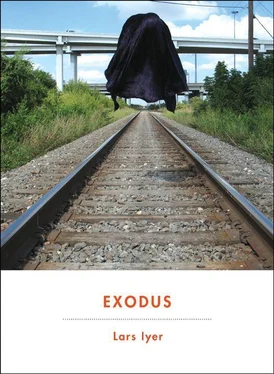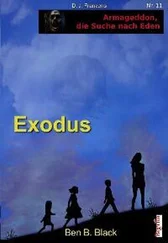We should bring our thinkers here, W. says, the ones we hope will become our leaders of thought. This is the perfect place to help them walk away from their troubles. It’s the perfect place to help them walk their way to thought .
Haven’t we taken many walks alongside one or other of our thinkers? Haven’t we been able to loosen our thinkers from the crowd and take them outside ?
Thinkers have thanked us for nothing less: for giving them freedom from the crowd. Crowds are unbearable to the real thinker, W. says. The thinker always wants to escape. And so we’ve taken many such journeys — journeys out, away from the others, in company with one or other of our thinkers. Away from the tumult.
We try to calm our thinkers on such walks, that’s our main task, W. notes. We try to put them at ease, drawing attention to the pleasant vistas around us, to the blueness of the sky, to the peace of the forest. We make no demands. It’s not about us: we’ve always grasped that.
Occasionally, W. says, I’ve begun to expound my caffeine theories , and he has to put a stop to it. He prods me when our thinker isn’t looking. He raises his finger to his lips. And occasionally, W. ventures to introduce some intellectual topic or other before pulling himself back, apologising.
Let the thinker introduce the topic! , we’ve always told ourselves. And sometimes they do. Sometimes they begin to speak, and we respond only to enable them to speak some more, only to let ourselves drift into the central current of their reflections.
What a privilege it is to hear a thinker think! To hear the latest ideas of a thinker extemporised to us as to no one in particular! To be the beach upon which the thinker-sea spreads its waves! To be the shore over which the thought-ocean breaks!
Of course, we can understand little of what we hear. But we expect nothing more. In the end, it’s not meant for us! We’re overhearers, not interlocutors. We’re listeners-in, not conversation-partners. To our credit, we’ve always understood that. It’s why we’re popular with thinkers, W. says.
We don’t have ideas, and we don’t pretend to! In the end, we demand nothing, we ask for nothing. The lightness of our chatter (for we speak when our thinker is silent) is like the murmur of grasshoppers on a summer evening. The to-and-fro of our banter is like the trickling of a young stream: a backdrop, a kind of night against which the star of the idea can burn ever brighter.
In the final judgement, if we were not thinkers — if we never had an idea of our own — then neither did we hinder thought. We were not its enemies. They were not enemies of thought: isn’t that what they might write on our tombstones?
Ah, but there are no thinkers with us today, as we stroll around the lake at Leazes Park. We’ve been thrown back on ourselves, once again! Thrown back: not upon thought and the development of thought, but upon the babble of non-thought, with no real thinker in sight.
‘Did you bring some Schnapps?’, W. asks. I brought some Schnapps. — ‘Is it chilled?’ It’s straight from the freezer, I tell him, as the Danes would serve it.
Aalborg akavit, for our picnic. Did Kierkegaard drink Aalborg akavit? W. wonders. Undoubtedly! Kierkegaard would certainly have drunk it in his early years, his pagan years, W. says. He probably drank himself blind on Aalborg akavit before his return to his faith, just as we must drink ourselves blind on Aalborg akavit, we who are lacking in faith, in Kierkegaard’s faith.
And did I bring the herrings? Yes, I brought the herrings, and a disc-shaped packet of crispbread, and some cod roe sandwich paste from the grocery in Ikea . And we have some ryebread, too. — ‘Good’, W. says, ‘we’re well prepared’. To think like a Dane, you need to eat and drink like a Dane, we agree.
We’re method thinkers , we’ve decided. A bit like method actors. It’s a question of immersing ourselves in what we study. Of plunging into it. We have to become more Kierkegaardian than Kierkegaard, W. says. More Danish than the melancholy Dane!
It’s like reverse engineering, W. says. We begin with the finished product, i.e., the complete works of Kierkegaard in the Hong and Hong edition, and we work our way back to the mind of the thinker who produced them. But not only to the mind! To the cultural world of the thinker; in this case, to the cultural world of nineteenth century Denmark. And to the physiognomy of the thinker; in this case, a melancholy disposition, a heaviness of the soul. We must move from the outward to the inward, W. says. Only then, having reached the secret centre of the work, having come to its engine room so to speak, might we work our way back out again.
Of course, one mustn’t start reading too soon, W. is adamant about that. One mustn’t simply devour an oeuvre , tempting as it may be, the many-coloured spines of Kierkegaard’s works in the Hong and Hong edition, lined up on my windowsill, as inviting as boiled sweets.
One cannot just begin at page one, and then read one’s way to the end, W. says. There must be a kind of pause before reading, a dwelling in the space opened by the fact of Kierkegaard, by the fact of his writing, by the fact that he lived.
That Kierkegaard wrote : we should pause before that, mulling it over, W. says. That Kierkegaard was at all : we must pause before that, too. And that we exist at all, in our stupidity: ah, that’s what’s unbearable, W. says. The fact that, despite our best intentions, we’ll never be able to understand a word of Kierkegaard.
What is the connection between Kierkegaard and capitalism?: that’s our question, W. says. What does Kierkegaard tell us about the despair of capitalism? These are the questions that must accompany us on our lecture tour of Britain, of the doomed universities of Great Britain.
The train south. County Durham. Open fields. Hamlets nestled into the countryside.
W. speaks of his Canadian boyhood. Things seemed so simple then, among the forests and the lakes! His body and soul were one. He lived in fellowship and harmony with the world. He would never have needed to think, had his family not returned to Britain, W. says. Had they not fallen to earth in this ridiculous country. He would have had nothing to think against. To read against!
Wasn’t it in Britain that his first intellectual adventures began? Wasn’t it here that he was dazzled by the bright orange dust-jackets of the Schocken edition of Kafka? The Canadian has no need for Kafka, W. says. A Canadian Kafka-reader is a contradiction in terms!
W. tells me the latest research on cow intelligence . Brighter cows network , W. says — they go from cow to cow, nuzzling their fellows, licking them, reminding them that they exist. Soon they become sought after, even dominant. The other cows rush to meet them. More stupid cows never network, never approach their fellows, W. says. Eventually, all the other cows stand with their backs to them. — ‘Is there a lesson here, do you think?’
I can’t feign friendliness, W. says. I can’t feign interest . In the end, the art of conversation is entirely alien to me, W. says. The art of greeting people. When he did try to teach me, it led to disaster. I bellowed. Hello! , I cried in my loudest voice. — ‘You scare people’.
Sometimes, the power to speak deserts me altogether, W. says, and the other person has to guess what I want to say. It invariably happens when things are most urgent, and I need to be most succinct. There’s a great stuttering and stammering. A great foaming at the mouth. — ‘You can’t get a word out, can you?’ W. has to intervene in such situations. ‘Gesture!’, he says. ‘Mime! What is it? More food? Something else to drink?’
Читать дальше












